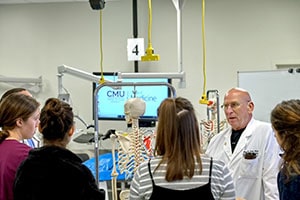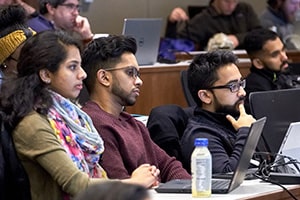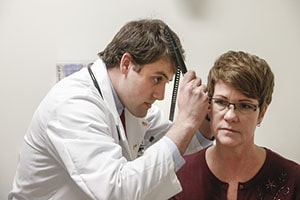Pre-Clerkship Years 1 and 2
Years 1 and 2 of our MD program curriculum enable students to develop a solid foundation of medical knowledge, fundamental skills in history taking and physical examination, and an appreciation of the social, cultural and economic factors influencing day-to-day health systems practice and patient care. Didactics in years 1 and 2 take place on our Mt. Pleasant campus, and benefit from modern facilities, advanced learning technologies, and the extensive resources that a large university like Central Michigan has to offer.
The design of the years 1 and 2 curriculum follows an integrated, systems-based, and patient presentation approach. Students are guided to develop their foundation of medical knowledge in the same context that they will need to apply that knowledge.
 All traditional disciplines, such as genetics, anatomy and biochemistry, are delivered in an integrated way; the same way a patient presents. This approach allows students to more readily appreciate the relevance of foundational medical knowledge in the practice of medicine, and to understand how these traditional disciplines contribute to patient wellness and disease.
All traditional disciplines, such as genetics, anatomy and biochemistry, are delivered in an integrated way; the same way a patient presents. This approach allows students to more readily appreciate the relevance of foundational medical knowledge in the practice of medicine, and to understand how these traditional disciplines contribute to patient wellness and disease.
Medicine is a team-endeavor, and so we promote this same approach to learning in our students’ educational environment. The curriculum is student-centered, placing an emphasis on active learning in a team-atmosphere. Didactics are delivered using small-group clinical cases, Team-Based Learning sessions, and interactive large group sessions based upon clinical vignettes. From day 1 of the curriculum, students are required to engage in thoughtful discussion with faculty and peers, develop appropriate medical vocabulary, and use the wisdom of the team to find answers.

The College of Medicine uses a holistic admissions process that values commitment to service, leadership, and breadth of experience. Not all students come to medical school with common core knowledge. Therefore the curriculum begins with two 8-week Foundational Sciences of Medicine courses designed to allow students to develop an understanding of medical sciences to a level that will allow them to engage in the meaningful study of each of the body’s organ systems.
Year 1 and 2 Course Sequences
Year 1
- Foundational Sciences of Medicine A: 8 Weeks
- Foundational Sciences of Medicine B: 8 Weeks
- Reproduction & Human Development: 6 Weeks
- Cardio-Pulmonary: 7 Weeks
- Renal-Endocrine: 6 Weeks
Year 2
- Neuro-Behavioral: 8 Weeks
- Gastrointestinal: 6 Weeks
- Musculo-Skeletal-Dermal: 4 Weeks
- Hematology-Oncology: 4 Weeks
- Synapse: 4 weeks
Throughout years 1 and 2, students are also enrolled in two longitudinal courses that integrate across the first two years and horizontally integrate with the systems courses. The Class of 2023 (M2) will continue with three longitudinal courses that began during their M1 year. These longitudinal courses are:
- Essentials of Clinical Skills
- Medicine and Society
 Medicine and Society (MS)- integrates population and public health concepts with individual and community needs, health, and healthcare access, providing essential context for ethical, cultural, legal and organizational concepts. Other Medicine and Society topics include foundational elements of professionalism, ethics, humanities, and self-care in the medical profession.
Medicine and Society (MS)- integrates population and public health concepts with individual and community needs, health, and healthcare access, providing essential context for ethical, cultural, legal and organizational concepts. Other Medicine and Society topics include foundational elements of professionalism, ethics, humanities, and self-care in the medical profession.
Essentials of Clinical Skills (ECS)– is an integrated clinical, diagnostic, and therapeutic skill development course using standardized patients. Emphasis is placed on history-taking, physical examination, and diagnostic skills which all align with the organ system being studied. ECS incorporates low and high-fidelity simulation exercises where appropriate to emphasize clinically relevant basic science concepts addressed in on-going organ systems courses.
Other elements of ECS include:
Interprofessional Education (IPE)– students engage in several unique interprofessional learning opportunities over the course of their 4 years of medical school. Including but not limited to; working with other health professional students in an active and engaging environment.
Interspersed between courses are a series of week-long experiences known as Bridge Weeks. These weeks serve as a means of providing dedicated time for student assessment, and the delivery of important curriculum components related to diversity, equity and inclusion, academic success, career advising, personal wellness and financial literacy. In addition, Bridge weeks provide students with the opportunity to provide the college with feedback via evaluations of their curricular experiences that is used in the process of continuous quality improvement.
